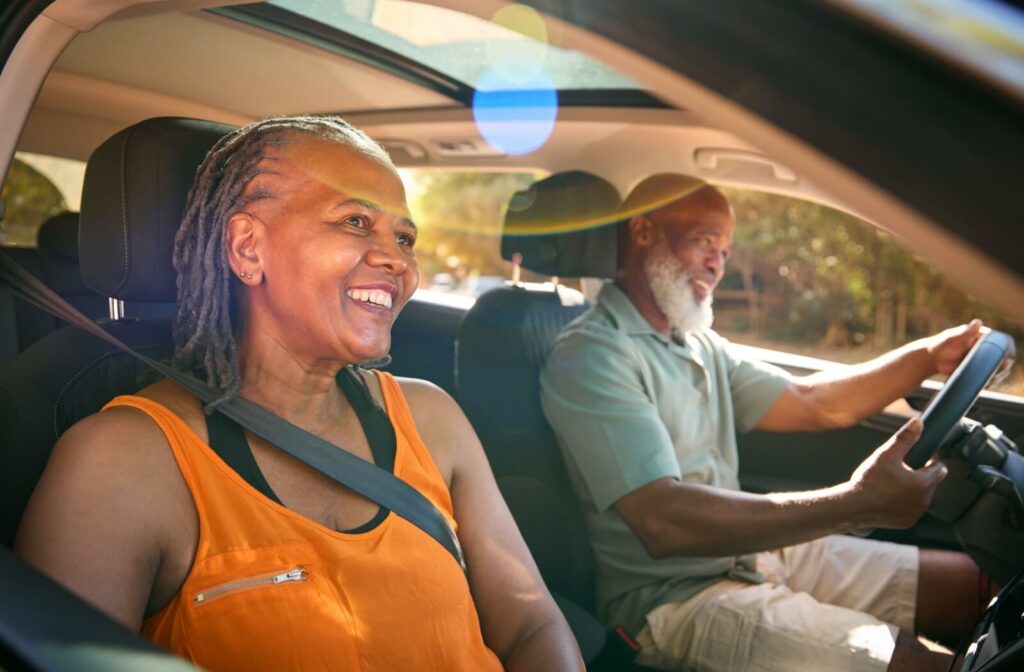Being able to drive is a key part of modern society, and we’re able to navigate the world at speeds our ancestors never could have imagined. But it also requires a person to be healthy; conditions like dementia, Alzheimer’s, and plenty of others can affect our ability to remain independent and behind the wheel. Unfortunately, one of these conditions is Parkinson’s—but can you still drive with Parkinson’s?
In the earlier stages, Parkinson’s rarely affects your ability to drive. However, as the condition progresses, it can significantly affect a person’s motor function, making it too dangerous to safely remain behind the wheel. It’s essential to regularly schedule visits with a healthcare professional to determine if Parkinson’s is affecting your ability to drive.
What Is Parkinson’s?
Parkinson’s disease is a progressive disorder that primarily affects the nervous system. It affects the part of the brain responsible for controlling movement, often leading to tremors or stiffness. This is caused by the death or overall loss of brain cells responsible for producing dopamine, the neurotransmitter responsible for coordinated muscle movement.
Parkinson’s usually develops gradually, often causing the onset of small tremors, shakes, and stiffness. Over time, these symptoms get worse, having more and more of an impact on the body.
It’s unknown why Parkinson’s develops, but it’s believed that genetics are involved. While it can be treated, there is no known cure for Parkinson’s disease.
What Does Parkinson’s Do to Your Body?
Parkinson’s is easily recognizable by shakes, tremors, stiffness, and involuntary movements. This is due to the loss of the dopamine-producing cells in the brain. Dopamine is responsible for helping you coordinate muscle movements smoothly and efficiently—think of it like a messenger between the brain and your muscles.
At first, Parkinson’s typically only causes minor shakes and stiffness. These likely won’t impact a person too much; instead, it’s often more inconvenient. However, while the shakes and tremors are trademark signs of Parkinson’s disease, they aren’t the only symptoms that can develop. In later stages, it can also cause:
- Balancing and stability problems
- Difficulty sleeping
- Loss of smell
- Mood changes
- Trouble swallowing and speaking
- Cognitive changes
Eventually, these symptoms can start to affect a person’s everyday life. It may be more difficult to safely navigate the environment, or minor neurological changes may begin to develop.
While these symptoms can pose significant challenges to a person living with Parkinson’s, they don’t have to signify independence. Many people living with this condition find ways to adapt their lifestyle, habits, and activities to accommodate their changing abilities, remaining independent where possible to continue leading a fulfilling life.
Are You Allowed to Drive if You Have Parkinson’s?
If you’ve been driving for a long time, you may have forgotten how difficult it can be at first. This seemingly simple skillset requires you to:
- Pay attention to everything around you
- Coordinate your muscles smoothly and seamlessly
- Make quick decisions
- Recognize potential problems, threats, and dangers
You need to do all of this while controlling a vehicle weighing several tons—which means a problem can be extremely dangerous.
While it may seem like Parkinson’s would stop you from driving, though, this isn’t necessarily true. In earlier stages, the stiffness and tremors are unlikely to prevent you from getting behind the wheel. However, it’s extremely important to note that this varies from person to person; if your condition is determined to be too dangerous for you to safely drive, always follow the advice of your doctor or primary physician.
Your physical capabilities aren’t the only factor at play, though. Laws can vary from state to state, but generally lean towards a fit-to-drive standard. This means that as long as your healthcare professional determines you can operate a vehicle safely—and you can prove it—you likely will have the right to drive. If you or a loved one have Parkinson’s and plan on driving, it’s essential to get the all-clear from a healthcare professional.
It isn’t just a one-time test, though; you should regularly schedule checkups to ensure you’re being responsible behind the wheel. Remember: Parkinson’s disease is a progressive condition, and symptoms may worsen as time goes by. There may come a point when it’s no longer safe for a person with Parkinson’s to drive.
When to Stop Driving with Parkinson’s
Even though it can be an extremely difficult decision, there may be a point when a person with Parkinson’s needs to hand over the keys and stop getting behind the wheel. Safety should always be a priority in all parts of life, and driving is no exception.
It’s essential to recognize the signs that a person with Parkinson’s can no longer safely drive a vehicle. Keep an eye out for the following signs:
- Frequent close calls or minor accidents
- Trouble navigating familiar roads
- Forgetting the rules of the road
- Difficulty turning to check blind spots
- Slow reaction time
- Other drivers honking, yelling, or displaying road rage toward the driver
If you’ve noticed any of these signs, it’s time to think about changing. Though it can be challenging to admit, it’s dangerous to drive a vehicle when any medical condition impacts your capabilities behind the wheel.
What to Do If a Loved One Has Parkinson’s
If you have a loved one with Parkinson’s, it’s essential to understand and support their situation. Start by having an open and honest discussion about their capabilities behind the wheel; don’t try to be confrontational or demanding, but remain calm and supportive. Try to encourage them to visit their doctor to get a professional opinion.
It can also help to think about alternative transportation options like:
- Public transportation
- Taxis
- Private car services
- Family and friends
There’s another option often unconsidered, though; senior living communities. These communities, like ours at The Parkdale Senior Living & Memory Care, often offer transportation services to residents to important events and appointments so they can maintain a level of independence. Alongside transportation, these communities are staffed with excellent teams of people experienced in supporting older adults living with conditions like Parkinson’s disease.
By considering senior living, you can get your loved one proper care and support, all while promoting the independence they’d find behind the wheel themselves!

Senior Living & Parkinson’s Disease
At The Parkdale Senior Living & Memory Care, we know how important it is to stay independent. Our team is here to help your loved one feel at home, and we’re proud of the services and amenities we offer to each and every one of our residents. Schedule a visit with us today to see for yourself!



